India holds elections in remote Himalayas
Conducting polls for lone parliamentary seat in Indian-administered Kashmir’s Ladakh region is big logistical nightmare.
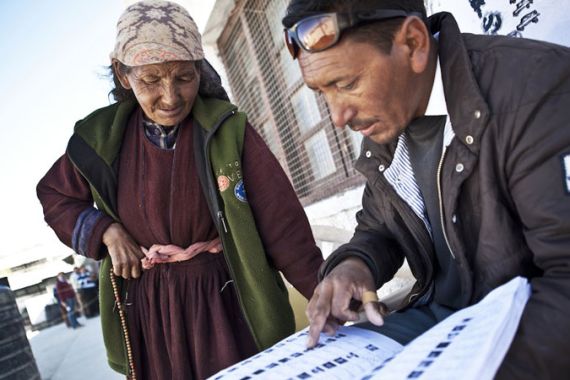
Leh, Ladakh – One of India’s highest electoral battlegrounds is at 15,000 feet – Anlay Phu – tucked among the jagged mountains of Ladakh, the northernmost and remotest region in the Himalayas. Here 67 out of 69 voters cast their ballot in the eighth phase of India’s staggered parliamentary elections.
“Polls in Ladakh are a herculean task. The expenditure per voter is nearly one lakh rupees ($1,667),” said Simrandeep Singh, returning officer, Leh – the regional capital.
Nearly 65 percent of people went out to vote. Polling was peaceful, with no disturbances from weather, a major worry for election officials.
Ladakh, a cold arid desert plateau is the largest parliamentary (Lok Sabha) constituency in India in terms of area. In the two districts of Leh and Kargil, there are 531 polling stations set up for 159, 631 voters scattered over an area over 173 million square km.
Four candidates, including two independents, Bharatiya Janata Party and the Congress party are in the fray for the lone seat.
For many voters, the most important demands were all-weather connectivity and union territory status for the region.
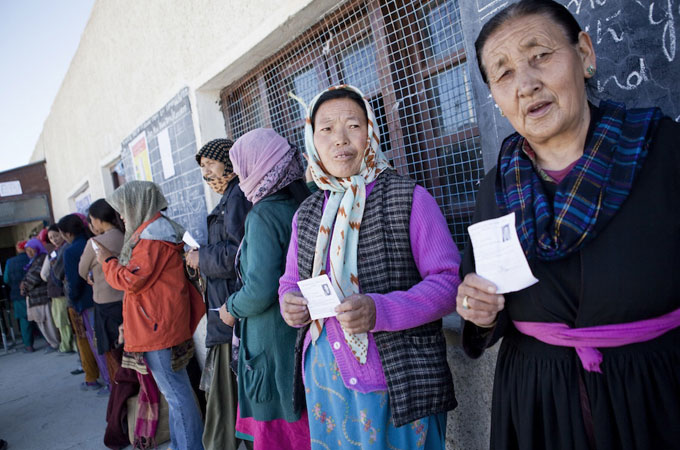 |
| Nearly 65 percent of people went out to vote [Bijoyeta Das/Al Jazeera] |
Logistical challenges
Ladakh meaning “land of high passes” is situated in the Indian-administered Kashmir, bordering China and Pakistan and is a repository of Tibetan Buddhism. Its rugged and stark mountains make for awe-inspiring panorama and repose – only to pose colossal logistical challenges.
Gaik has the least voters with only 10, out of which six voted, 37 polling stations have less than 50 voters. Only four polling booths have more than a thousand voters.
The control room inside the Deputy Commissioner’s office in Leh overlooking the snow-caped mountains is one of frenzy and angst. The room is plastered with white printed copies with names of polling stations, data, officials, and satellite phone numbers.
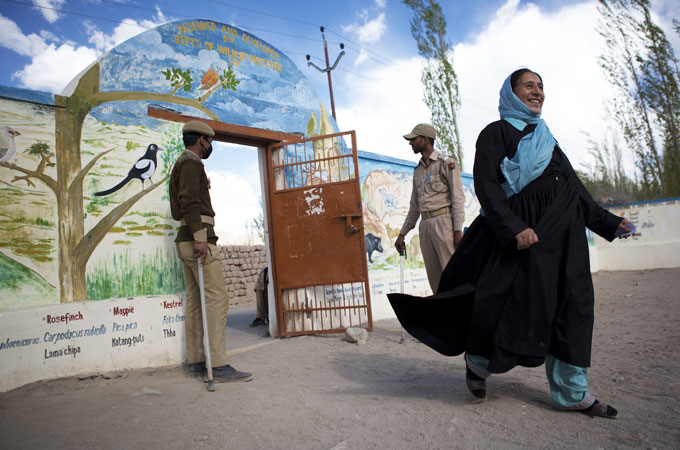 |
| Air Force is pitching in by flying food and water bottles for polling staff from neighbouring Chandigarh [Bijoyeta Das/Al Jazeera] |
“Sometimes we have to dial the same number hundred times, it is a real nightmare,” said Ghulam Mohd, an election official.
Even after two hours of closing of polls, more than a dozen officers are hooked to mobile, wireless, landline and satellite phones to collect data and declare the final turnout. During the entire day, they have not been able to establish any contact with eight polling stations – Chokdo, Markha, Kaya, Sumdo, Skumpata, Yangthang, Ullay and Upper Leiker.
Inaccessible areas
Ladakh’s sparsely populated and barren landscape, punctuated with monasteries, pit polling personnel against inhospitable terrain, tapering or no roads, glacial snow, severe altitude sickness – testing resilience and sapping resources.
“The biggest challenge has been for the polling officers to reach inaccessible areas and remain healthy,” Singh said. A few polling officers felt sick but it did not affect polling, and though he is still worried about the safe return of staff, as passes could be blocked due to snow.
Ramesh Kumar Bhat, polling officer for Fastan, situated at 12,000 feet, belly-crawled the steep, narrow track, gasping for air. Sunburnt and wind-chapped, he never dared to look down as he climbed for hours the arid, jagged mountains of Ladakh, located between Himalayan and Kunlun range.
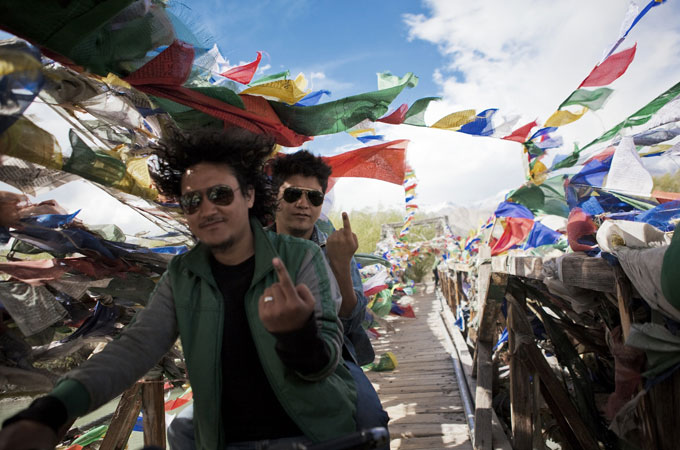 |
| For many voters, key demands were all-weather connectivity and union territory status for the region [Bijoyeta Das/Al Jazeera] |
Two ponies in tow carried sleeping bags, windcheaters, dry food and the most prized lot – the electronic voting machines and indelible ink.
“I was very scared and I prayed a lot. My stomach was bloated, eyes were burning, nose bleeding and I had a thumping headache,” said Bhat. Twenty-four of the 26 registered voters cast their ballot.
The party of four, including police, traveled for two days from Leh, while popping Daimox pills to fight nausea and drinking yak-butter tea.
“It was a spectacular view but I did not dare take a photo because the path was so treacherous and we were worn out,” Bhat told Al Jazeera using the only connector, the satellite phone.
Five polling stations Youlchang, Neraks, Linghsshet, Skumpata, Dipling in Leh and the polling stations in Zanskar Range in Kargil were only accessibly by helicopters.
Others, including Sriyul, Hunker Largyab Pachadhang, Rumbag, Largyab and Man, Merak, Spangmik, Chuchul required days of road travel, pony, donkey and yak rides, use of electric trolleys, and hours of trekking. Some polling stations were set up in tents to keep up with Changpas nomadic tribes in eastern Ladakh, who rear yaks, horses, sheep and the famed Pashmina goats.
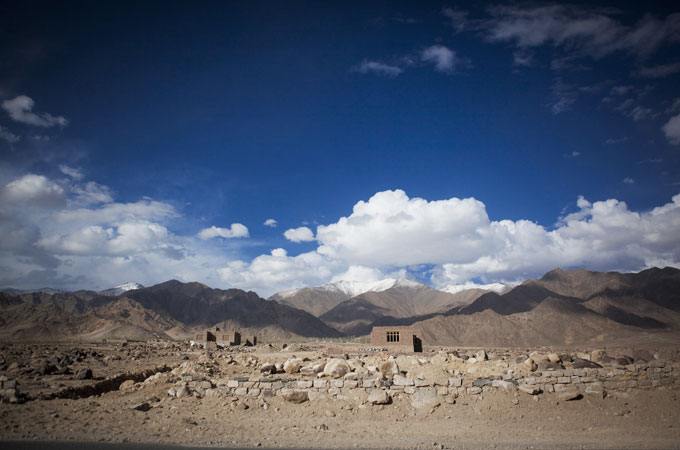 |
| Leh is a vast green valley surrounded by brown hills and is dotted with mud-brick houses and Buddhist stupas [Bijoyeta Das/Al Jazeera] |
Leh, the backpackers’ capital, is a vast green valley surrounded by dry brown hills and is dotted with mud-brick houses and Buddhist stupas. It is the epicentre for all electoral activities, including training, acclimatisation of election officials, filing of nomination papers and dispatching of election machinery.
The movement of polling personnel began ten days before election, with the help of Air Force, especially for booths in Kargil district, Singh explained.
“Hundreds of police personnel were airlifted from Srinagar – the main city in Kashmir – to Leh, transported by road from Leh to Kargil and then helicopter from Kargil to Zanskar and further transported in cheetah (small single-engine helicopters),” he said.
In Leh, most polling parties were dispatched three days before voting day.
Blocked roads
As the summer sets in, tourists have started to trickle in and the apricot trees here are sporting white and pinkish flowers, but the region is only accessible by flights from New Delhi. For the last six months, surface links via Srinagar and Manali highways have been closed.
Traditionally road links to Ladakh are reinstated by April 25. The delay, because of heavy snow, has caused markets in Ladakh to run short of essential supplies including, fresh fruits and vegetables, eggs, bottled drinks. Many items in the menus of restaurants have been scratched off. Stores carry only goods dated from last year.
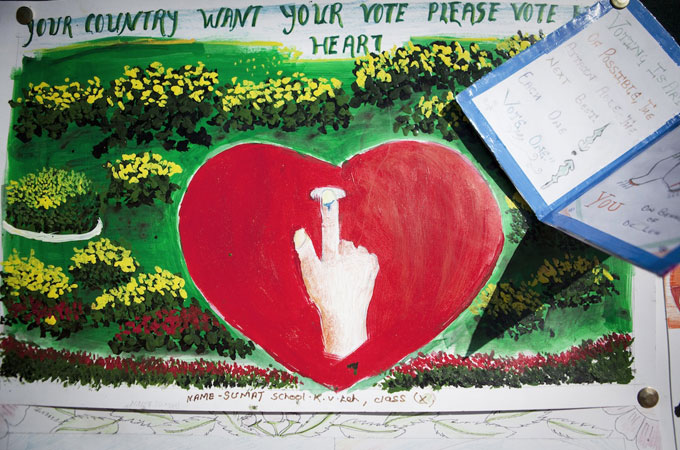 |
| Polling stations were decorated with paintings made by school children to reflect the “peaceful mood” [Bijoyeta Das/Al Jazeera] |
Force is pitching in by flying food and water bottles for polling staff from neighbouring Chandigarh. They have also airlifted potatoes, onions to make fried snacks and toffees that were distributed along with tea to voters at seven model polling stations, to create a “happy voting experience,” election officials said. These stations in Leh were decorated with paintings made by school children to reflect the “peaceful election mood” in Ladakh.
“These environmental conditions are nowhere in the world, so few roads, and even the rivers are melted so people can’t walk on them so we are providing all logistical support,” said Rajesh Isser, commanding officer, air force station, Ladakh.
About 2,000 voters in the periphery are very close to Line of Actual Control (LAC) to demarcate the areas occupied by China and about nine polling stations are near the Pakistani borders.
Doordarshan and All India Radio, the public broadcasting networks, with 100 percent coverage, had been encouraging people to vote in remote areas. BSNL, the state-owned telecom company had made “a message to vote” as caller and dialer tunes.
“But when it comes to covering the elections even Doordarshan can reach only a small faction of the area,” said P Wangchuk, a programme executive.
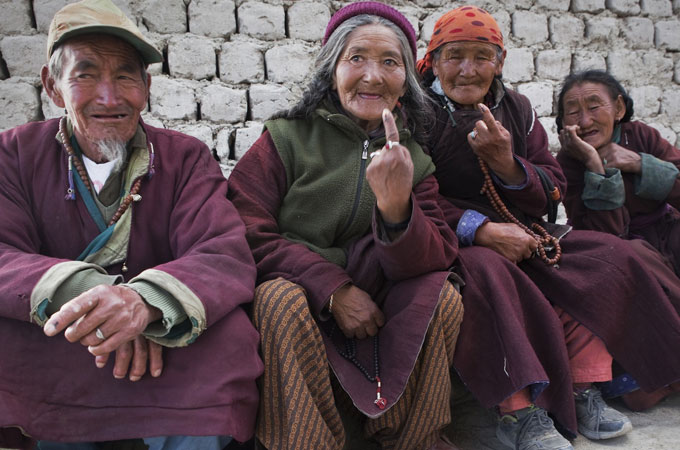 |
| Ladakh, a cold arid desert plateau is the largest parliamentary constituency in India in terms of area [Bijoyeta Das/Al Jazeera] |